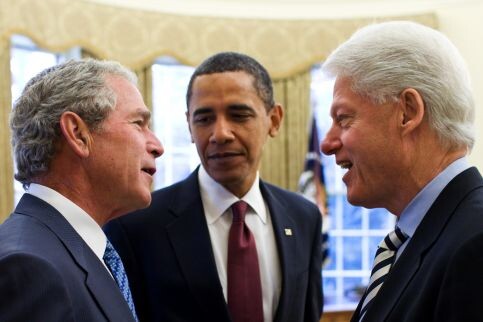The Electronic Intifada 21 December 2010

(Pete Souza/White House)
This month marked a low point in the Obama administration’s attempts to resolve the Palestinian-Israeli conflict. Following the administration’s announcement on 7 December that it was ending efforts to secure a 90-day extension of Israel’s limited moratorium on settlement building in the occupied West Bank and East Jerusalem, Secretary of State Hillary Clinton introduced “Plan B” for resolving the conflict three days later. Instead of emphasizing direct talks between the parties, Washington will now attempt to mediate between them to develop a framework agreement around the core issues of borders, refugees, and Jerusalem. Sound familiar? It should. The Obama administration is following the same failed path of its three predecessors to achieve peace. In other words, there is no Plan B.
Clinton explained that the conflict “is a source of tension and an obstacle to prosperity and opportunity for all the people of the region” and “at odds also with the interests of the United States” (“Remarks at the Brookings Institution”). Why then is the administration adopting such a well-trodden and ineffective approach? Because contrary to its public statements, Washington’s policies reward Israeli intransigence and ensure that its occupation of the Palestinian territories continues indefinitely.
Since the Madrid Peace Talks were convened in 1991 by President George H.W. Bush, the “peace process” has often been described as long on process but short on peace. However, over the past decade, first under George W. Bush and now Obama, the emphasis has been on the appearance of process. Shuttling between world capitals, successive secretaries of state and presidential envoys have sought to appear engaged and determined to resolve the conflict, offering banal platitudes while hosting summits with great fanfare but little substance and even fewer results. As demonstrated by the vague outlines of Clinton’s Plan B, the administration of change now offers more of the same. If the peace process wasn’t dead before, it certainly is now.
Guaranteeing that this policy retread will fail is Netanyahu himself. During his first term as Prime Minister, Netanyahu relied on allies in the US Congress to shield him while he worked to derail the fledgling Oslo peace process — a strategy he will adopt again. In 2002, Netanyahu boasted to French-Israeli journalist Charles Enderlin that he “managed to knock down the Oslo accords.” Netanyahu explained that he secured a letter from President Clinton stipulating that “Israel alone would decide on the extent and place of future deployments” [from the West Bank]. “From now on,” he asserted, “we had our foot on the brake. We were in command” (Shattered dreams: the failure of the peace process in the Middle East, 1995-2002).
Netanyahu made similar claims to private audiences. In July, Israel’s Channel 10 released a video of a 2001 meeting in which Netanyahu stated that he “stopped the Oslo accords” by refusing to ratify the withdrawal from the Palestinian city of Hebron until he obtained a letter from Clinton that recognized Israeli military sites in the Jordan River Valley as “security zones.” He explained that “The trick is not to be there [in the occupied Palestinian territories] and break down; the trick is to be there and pay a minimal price” (“Leaked Netanyahu Video,” IMEU, 21 July 2010).
Nor has his philosophy changed since returning to power. As demonstrated by two 2009 cables released by WikiLeaks, Netanyahu informed a visiting American Congressional delegation that he envisioned a Palestinian state with “refined” sovereignty. As he explained, “A Palestinian state must be demilitarized, without control over its air space and electro-magnetic field, and without the power to enter into treaties or control its borders” — a Palestinian state in name only (CODEL KYL’s Meeting with Prime Minister Netanyahu).
“We can’t want peace more than the parties themselves” was the mantra of the Bush administration. President Obama not only adopted this philosophy but his predecessor’s policies as well, including the unwillingness to offer his own peace plan to resolve the conflict. Secretary of State Clinton now claims that the US will “offer our own ideas and bridging proposals when appropriate.” Will these proposals help to break the impasse? Or will they merely mark the return of what former State Department official Aaron David Miller described as the US serving as “Israel’s lawyer?” Based on the Obama administration’s lackluster performance to date, skepticism is justified.
If Washington will not lead and Israel will not negotiate in good faith, then it is incumbent on the Palestinians and those who support peace and justice in the region to seize their own future. Indeed, this process has already begun on both official and grassroots levels. It is seen in the weekly non-violent protests by Palestinians, Israelis, and international activists across the occupied West Bank against Israel’s separation wall. It was also observed in the recent announcements by Brazil and Argentina recognizing a Palestinian state in the West Bank and Gaza Strip with East Jerusalem as the capital — with more countries to follow. And it is seen in the burgeoning international boycott, divestment and sanctions movement. Change is coming, but not from Netanyahu or the Obama White House.
Osamah Khalil is the co-director of Al-Shabaka, The Palestinian Policy Network. He can be reached at osamah A T al-shabaka D O T org. This article originally appeared in the Huffington Post and is republished with permission.




